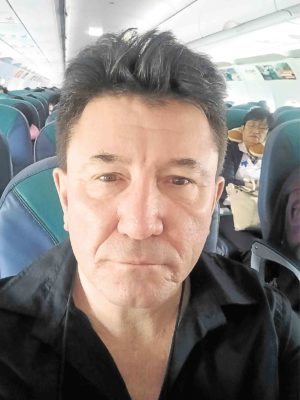Talk to Abu Sayyaf, Australian kidnap victim urges gov’t
ZAMBOANGA CITY — Like President Rodrigo Duterte, Australian kidnap victim Warren Rodwell said he favored talking to Abu Sayyaf bandits to determine what they really wanted, hoping to stop the group’s criminal activities.
“I don’t want the Philippine government to kill or hurt my captors. The way to reach to them is to talk to them. If they are arrested, don’t kill [them]; put them behind bars,” Rodwell said through a Facebook chat on Sunday.
Rodwell issued the statement after learning that Nurhassan Jamiri, the leader of the group that abducted him in 2011, had yielded to the military.
The Basilan-based Jamiri surrendered to soldiers in Hadji Mohammad Ajul town on March 28 together with 13 Abu Sayyaf men, according to Lt. Gen. Carlito Galvez Jr., commander of the Western Mindanao Command.
Jamiri and his men also turned in their firearms.
Article continues after this advertisementSuccessful negotiation
Article continues after this advertisementThe surrender took place two days after Mr. Duterte visited Patikul town in Sulu province and urged Abu Sayyaf bandits to yield and talk to him.
Galvez described Jamiri’s surrender as a product of a successful negotiation and collaboration between government troops and local officials led by Basilan Gov. Jim Saliman Hataman, Isabela City Vice Mayor Cherilyn Akbar and Ustadz Hud Limaya, deputy commander of the Moro Islamic Liberation Front’s 114th Base Command.
Commitment
The latest surrender had brought to 202 the number of bandits who had turned themselves in since martial law was declared in Mindanao in May last year after Islamic State-inspired terror groups laid siege to Marawi City, Galvez added.
Rodwell, who said he nearly died in captivity due to blood loss from a bullet wound, welcomed the surrender of Jamiri and the government’s commitment to provide them livelihood and housing.
Reintegration
“Forgiveness and acceptance … I have no ill feelings against any of my … captors,” he said.
Rodwell said people might question his position on the Abu Sayyaf problem, but he wanted to make them understand that the likes of Jamiri “were born into that situation (lawlessness).”
Rodwell said the planned reintegration program for Abu Sayyaf bandits who surrendered to the government “sound[ed] wonderful.”
“We can only hope that Abu Sayyaf members in custody are also trained for their own benefit,” he said. “Which is more important for society? Punishment or rehabilitation? Are these people any less human than we think we are?”
He said it was not enough to simply identify a social problem, but “it’s more important to look at ways of minimizing or eliminating the impact of such.”
Rodwell, however, said he would not drop the charges he filed against Jamiri and his other captors. “I’d leave it to the court. I’ll let it undergo the normal proceedings,” he said.
